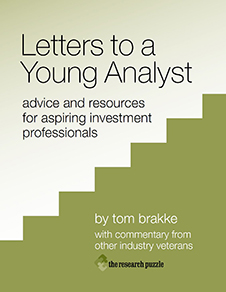
- Tuesday, May 24th, 2016
- a best practice for funds
-
“One of the great legal fictions of Wall Street is that mutual funds are independent of the companies that create and run them.” So said Floyd Norris at the top of a 2010 column.New York Times | The article concerns a court case regarding Janus and the mutual fund trading scandal earlier this century.
“Is Your Fund’s Board Watching Out for You?” was the title of an article a couple of years later in the Wall Street Journal.Wall Street Journal | The piece looks at the poor performance of Charles Schwab’s YieldPlus bond fund during the financial crisis to talk about some of the issues regarding mutual fund governance.
Whenever mutual funds run into trouble of one kind or another, questions about the responsibilities of mutual fund boards come to the fore. Just in the last few months, developments at Sequoia Fund and Third Avenue Focused Credit Fund have drawn attention to them once more.
I have some thoughts about the responsibilities of those fund directors, but first some background.
Mutual funds are separate legal entities from the asset management firms that run the portfolios. However, in most cases, the managers exert essential control over the funds, thus the fiction that Norris described. If that’s the case, what are the fund directors there to do?
According to a publicationMutual Fund Directors Forum | The quotations that follow are from a section titled, “Introduction to Mutual Funds and Their Structure.” from the Mutual Fund Directors Forum, “Directors are expected to exercise their reasonable ‘business judgment’ in overseeing the Fund’s performance and that of its service providers.” They have a “duty of care” and “a duty of loyalty,” putting “the interests of the Fund and its shareholders ahead of their own interests and those of the Fund’s management or its service providers.” Independent directors (those without obvious ties to the asset management company) “are also expected to watch out for potential conflicts that may arise between their Fund and its service providers.”
Over time, the role of a fund director has evolved, as chronicled in a recent article, “The Changing Role of Independent Directors of Mutual Funds.”The Investment Lawyer | Matthew Fink and Jacqueline Edwards are the authors of the article. Should there be more specific guidelines for the directors or are the general principles mentioned above sufficient for them to do the right thing? It’s an ongoing debate.
Critics of the industry believe that they haven’t even dealt with their obvious responsibilities. To quote John Bogle (a conflicted party, to be sure) regarding fund expenses: “Almost every firm . . . is operated in a way that puts the manager in the driver seat and not the fund shareholder. This is the way the industry is organized, and the fund directors, even the independent directors, seem powerless to stop it.”Morningstar | The quote from Bogle is from this interview. The ellipsis contained a reference to Vanguard, the firm he founded.
In 1995, SEC Chairman Arthur Levitt told fund directors, “You’re in an ideal position to monitor new developments and trouble-shoot problems as they arise.” But, like a lot of gatekeepers in the investment ecosystem, that’s not how most directors operate. By and large, they are reactive — and they are under the sway of the management companies who nominally work for them.
The key problem is that the information on which they rely for the evaluation of the investment advisory firm comes from the firm itself. That is the conflict of interest that no one ever talks about.
Periodic reports received by the directors from the management firm detail the structure of a fund, the transactions, and, of course, the performance. They include commentary about economic and market developments in the past and projections about the future. Pretty standard stuff. And the portfolio manager of a fund may appear before the board of directors for a few minutes for questioning.
Some directors might be able to use that information to provide effective oversight, although (especially at big fund complexes where they may be overseeing scores of funds) it’s hard to see how much discovery or discernment could occur. In actuality, the manager’s narrative dominates its own evaluationthe research puzzle | Those evaluating managers have an obligation to “crack the narrative.” and past performance becomes the sole barometer of success.the research puzzle | My previous posting looked at the common problem of chasing performance.
Here’s a better way. The advisory contracts between funds and their advisors should specifically state that independent evaluations of the funds are to be performed on a periodic basis. I don’t mean audits, which are already required, but rather holistic evaluations of the investment management organization in order to assess its ability to deliver value to the fund’s shareholders over time. As the agents of the fund board, the independent evaluators would be granted access to members of the organization in order to do their investigative work.
The goal would be to provide better and more objective information to fund directors; as a byproduct, it would help to improve the asset management organization over time. As a result, shareholders of funds would be much better served than they are today. Maybe the “fiction” of effective oversight by fund directors would have a chance to become fact.
The cost of an independent evaluation would not be onerous and could easily be covered by a slight reduction in the management fee. The resulting trade-off for directors and shareholders would be positive, and even the asset management firms (at least the enlightened ones) could benefit from regular, in-depth evaluations of their organizations and methods by an outside party.
Granted, this is a simple idea, but it addresses a notable shortcoming in how mutual funds operate. Hopefully, in a few years, it will be recognized as a “best practice” for those funds seeking to do right by their shareholders.
